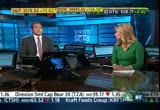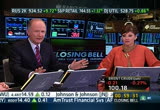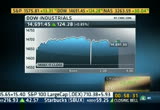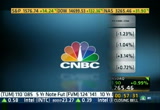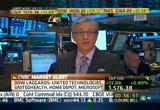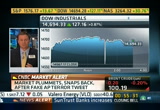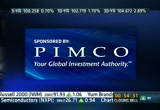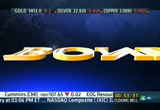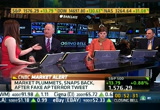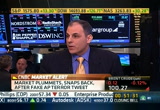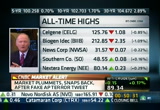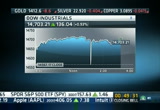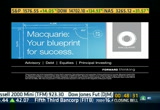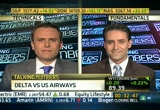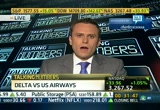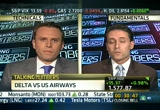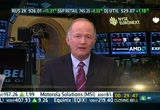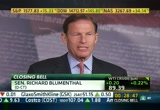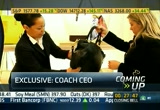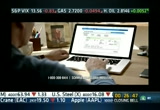tv Closing Bell CNBC April 23, 2013 3:00pm-4:00pm EDT
3:00 pm
pay people extra, if they have to work more, because of alleged misdeeds of your own corporation. >> that would be logic, but things don't always necessarily follow logic. thanks so much for watching today. you've been watching "street signs". >> "closing bell" is next. hi, everybody. welcome to the "closing bell." what a day. i'm maria bartiromo here at the new york stock exchange. this market in rally mode following a batch of strong earnings, but it's not that simple. >> it never is. i'm bill griffeth. the dow is back, higher after a free fall on the heels of an associated press twitter account being hacked and some hackers sent out an erroneous message about explosions at the white house and injuries to the president. that didn't happen. the ap has shut down its twitter account. the market is back again, but what a wild five or six minutes we had a couple of hours ago.
3:01 pm
we'll have more on this story, the impact social media can have ton markets. that's coming up in about ten minutes. right now the dow is up 125 points again. >> it shows you how vulnerable and edgy this market really is. we're going to get into that. the other big story, of course, behind this rally in stocks, is apple's earnings. we are awaiting its on deck, after the close tonight. could the numbers be the catalyst for returning things around for this beaten down stock, from coming down from below 700 to below 400. full team coverage on the apple results. >> one stock making a comeback today, following better than expected earnings, coach. chairman and ceo lew frankfort will be here to talk about that coming up in a few minutes. >> and a nice recovery today, but this stock is really coming from a huge sell-off. take a look at this chart here. and that really explains what went on very clearly, just at about 1:00 p.m., 1:15 eastern
3:02 pm
time or so, the market plummets on that erroneous report when the ap twitter account was hacked and bounces and comes all the way back when it becomes clear that it was, in fact, erroneous and the account was hacked. take a look at the dow, now up 1245 points. what's behind this rally? bob pisani in the middle of the action. there's the nasdaq up 30 points with technology seeing the same chart pattern and the s&p 500 at the same exact time. >> gold did the same thing. the currencies did the same thing, oil did the same thing. >> huge market reactions across the board. let's get to bob pisani in the middle of the action. over to you, bob. >> 140 points in one minute, it was wild on the floor. but we're right back to where we were prior to that 107 move to the downside. it's been a good day and a good day because of earnings. they were fine. here's the big story. big multi-national companies, your united techs all came out and affirmed their 2013 guidance. a couple noted their earnings will be a little light.
3:03 pm
they're expected to make it up in the second half of the year. that was good enough for most of these companies and for the overall market. take a look at airlines. good earnings, great earnings reported from delta. good one from u.s. air. delta said the magic words. we're well positioned to generate significant improvement and profitability. delta air up about 9%. the home builders also having a good day. new home sales came in blind with expectations. prices down a little bit, but barclays upgraded the whole group today. look at those nice moves up in all the big names. we're one-fourth of the way through earnings season right now. here's how it's shaping up. here's the good news. about 70% are beating on earnings. that's above average. the average about 62%. here's the bad news, only 42% are beating on the top line. that's way below the historic average of about 62%. bill and maria, bottom line is companies are continuing to beat on the bottom line, because they're becoming cost-cutting monsters, not because they're able to increase on the top line. of course, this is causing problems with hiring. why hire more people when you're not bringing in more money? guys, back to you.
3:04 pm
>> bob, thank you so much. let's break down the numbers and what has become a very eventful afternoon today for the markets. >> joining us in our "closing bell" exchange, mark minhivini. carol roth is with us, the author of "the entrepreneur equation." matt lock, we've gotten him off the floor after a couple of hectic hours. and our own rick santelli joins us as well. matt, i want to start with you. i missed this whole thing. i hear it was a pretty hectic several minutes on the floor. tell us what you experienced. >> you would have missed it if you were downstairs for two seconds. that's how fast it was. this is nothing like the flash crash. we can't even put them in the same context. this is a case where we saw a news service, we did not know it was fake, came out and the marketed were roiled, obviously. when that sort of news happens, there's going to be more sell side than buy side. it's natural for it to happen. while it was crazy, it wasn't that we couldn't handle it or didn't handle it. and when things got back to normal, we were able to handle it in a timely fashion down
3:05 pm
here. >> why do you think the reaction was what it was? just because people worried that the terrorism is deeper than anyone thought? what was -- why is this market so fragile? >> the market's fragile for numerous reasons. we're at all-time highs here. people are going to tend to take profits on any kind of news service story, but it is so prevalent after what we saw in boston. people's emotions are high. people remember these things down here. we have long memories of what went on. it's easy to pull the trigger on the sell side, and i don't mean that figuratively, with it's easy to pull the trigger there, get out, and re-evaluate your position. that's what we did down here, we were able to find out it was a faulty news service story and able to rally right back up. >> and rick santelli, it wasn't just stocks, you had gold, treasury, oils, a lot of things. in many cases, the computers were moving before the humans were, weren't they? >> it was. but i'll tell you what, when weird things happen, sometimes you learn a lot about the markets. carol, pay attention to this. we all think, you and i, that easy money is at the epicenter
3:06 pm
of the stock market rally. in a way, i can prove it, okay? the bank of japan is the new priority of easy money. we've talked about how the new carry trade is going to leverage, most likely in markets like u.s. equities. so let's look. let's look at the euro versus the dollar during the flash crash we had around 1:00. do you see any movement there? no. let's look at the pound versus the dollar. do you see any movement there? no. now, let's look at the dollar yen. let's look at the euro yen. let's look at the pound yen. they all show the flash crash of the ap erroneous story. what that tells me is the dollar yen is integral into the easy money rally of the stock market, and when the stock market made its big move, because of the ap story, it's funny how the yen, in all constraints, made the same move. >> mark, what about that? if you have money in this market and you've got to be reacting to things that may or may not be true, how do you have confidence
3:07 pm
to keep money in stocks? >> well, i think you need to have confidence in keeping money with stocks, but, of course, i lived through the '87 crash. and that was a much bigger decline than we've experienced in recent times. and now, we've got computers that can move much faster. the risk is definitely there. and we saw that today, where the market can move very fast. so i, i use stop losses and sometimes they get triggered when you have these types of moves and sometimes they save you. >> some traders told me, they got stopped out of this market, in many cases, because they did have the protection down there, but the market just blew through those stops and they got taken out of the market. >> the good news is that once you found out the information was incorrect, it bounced right back up again. that's the good news. >> well, and again, i think a lot of those computers to the downside, humans to the upside. they're able to figure things out. >> the computers believe the internet, people done believe the internet. >> exactly. what do you think of rick santelli's analysis in the currency markets and what it says about liquidity provided by central banks around the world?
3:08 pm
>> i always defer to professor santelli when it comes to currency, because it's not really my game. but you know when it comes to the stock market, that i do really believe that it is the quantitative easing that is at the middle of this rally. and my biggest issue, we saw this in terms of reporting how many companies are continuing to miss revenue. they're missing the revenue, not only projections, but on a year over year basis, look at how many companies are down. that does not bode well for the future. they need to catch up. i want to make an impassioned plea to the public companies out there. take your money and invest in hiring people. because if we don't hire people and we don't invest in human capital, you're not going to have any consumers to buy. >> but yet, you feel, mark, this is -- when we have a slow economy like this, this is a good time for the stock market, right? >> and the market does well when you're in a low economy. when real gdp is growing at 6% or higher, the market actually declines 4% per annum. however, when we're negative, minus 2%, we grow at about 30% per annum in the market. so right where we are right now,
3:09 pm
you grow at about -- you chug along at about 9% per annum or 2%. so this is a sweet spot for the economy, and the fed keeps defending, every time we slow down, they come in, qe2, qe3, the economic indicators were starting to bowl over and they're playing defense to prevent against a double-dip recession. >> and the economic numbers are not that great right now, so how do you justify investing in the market knowing, you say market goes up in a slow economy, but what if they're exceeding earnings growth expectations? >> also, when earnings are slower, the market does better. when they grow really fast on an overall basis, that's another time when the market discounts and turns down. so we're in a sweet spot right now for the market. >> one more question to matt cheslock before we let you go. what you expect this last hour here, especially since we have three big earnings reports coming out after the bell tonight. >> is there more than one? i thought it was just apple, actually. >> yes, there is apple, but you
3:10 pm
also have at&t and yum! brands as well. >> i think we'll focus on europe. the whisper numbers for apple have gotten maybe out of control, but the market has taken so much out of it already, it's poised for upside, i think. >> the expectations are for $10.01 from an apple, but whispernumber.com says it could be as high as $10.56. >> i've heard even $11. >> there you are. we're in whisper number mode right now. thank you, all. good to see you. thanks for joining us. we're headed towards the close, 50 minutes left in the trading day in what has been a wild day again. the dow is up 135 points. we were up 153 at the high of the day. >> you can see it on this chart, which is just so stunning. right after 1:00 p.m. eastern, you can see the dow plunge and snap back almost immediately after the report that, in fact, it was erroneous, that was a fake terrorism tweet from the associated press, because they
3:11 pm
were hacked. is there any way to prevent this kind of hacking, which had a huge impact on the markets today. that's next. and netflix seemed to have replaced apple in the company that can do no wrong. can apple start turning things around when it reports earnings after the bell? full team coverage coming up. >> and we can't forget about the other two names set to report instant analysis on at&t and yum! brands coming up on "closing bell."
3:14 pm
it was a fake tweet in a hacked associated press account that sent shock waves through the market today. it had to do with terrorism at the white house. eamon javers has details for us. eamonn? >> hi, bill. the fake tweet said that there had been, in fact, explosions at the white house and that barack obama was injured in those explosions. that fake and erroneous tweet went out at about 1:07 p.m. and shortly thereafter, at about 1:16 p.m., the associated press reporter at the white house had the chance to make a little news of her own. that's because the white house briefing was coincidentally scheduled at that time and the associated press traditionally gets to ask the first question.
3:15 pm
in this case, it was ap reporter julie pace who had a chance to clear up some of the confusion arou surrounding this incident. >> i want to say at the top that it appears as though ap's twitter account has been hacked, so anything that was just sent out about any incident at the white house is absolutely false and we'll be putting out something today shortly to clarify if that hasn't happened already. >> and the president is fine. i was just with him. >> and that is not something you see every day. the white house press secretary having to reassure reporters in the briefing room that the president is fine. but, clearly, here, guys, one of the things that washington is going to take from this is a look at how twitter plays with wall street algorithms in terms of trading. we just saw a decision by the s.e.c. within the past couple of weeks or so that they're going to allow companies to report financial information over twitter. now, this might cause a lot of companies to look at that and really re-examine twitter security to figure out just how safe those passwords are, to
3:16 pm
prevent a lower level example of this on a company basis for moving stock prices in the future, guys. >> all right. thank you so much, eamon. earlier this month, of course, the securities and exchange commission announced that companies can disclose information via social media. a move that was applauded in many circles. but after today's incident, now the skeptics are coming out. they're saying twitter may simply be too vulnerable to a trusted source. >> joining us now, joe greco, he's on the floor of the exchange here with meridian equity partners. michelle kwan with michelle kwan and associates is a former director of the u.s. computer emergency readiness team. we'll talk with her in a minute. and our own melissa lee is here. melissa, i'll start with you. we had some traders telling me on the floor here, they got stopped out of this market. they're not happy about that, but it does point to a way that investors can protect themselves, just in case you get an event like this, right? >> absolutely. stop loss is the key, bill. it's free for investors. and what you do, you basically designate the price in which you want to sell securities. generally, that's lower, just to protect yourself to the
3:17 pm
downside. the trick here, because there are no guarantees in life, while in large part that order will be executed at that price that you set, in a very fast-moving market, and we saw this in the flash crash back in 2010, when there's a sudden drop in the market, sometimes that order is filled below. but remember, these are once in a blue moon sort of events. and when you take a look at the swing, take a look at that chart there on the dow, it laooks lik a huge swing, but from top to bottom, it was a 1% swing on components like procter & gamble, that was a 2.4% swing. most investors, i bet you anything out there, even if they have stop-loss orders, they were not stopped at, because chances are they didn't put in that order for such a small swing at the end of the day. >> i wonder if you could say that for everybody, though, melissa. we can never know who got the fair treatment and who didn't. michelle kwan, let me get your take on what can be done about all of this. we all know privacy is gone, it's a new world in terms of technology and the hacking has
3:18 pm
gotten lifted and lifted and been accelerating. what can a corporation, an individual do about this? >> well, it's a challenge. because as we move more and more toward social media as our form of communications, we have to ensure different ways of securing that kind of communication. and that's very difficult. i mean, if you look at the just twitter hacks over the past month, even over the past year, they range from twitter being hacked and the passwords being stolen directly from twitter to people who use twitter's computers compromised and their passwords taken from there so passwords actually cracked on the web. so there's lots of different places that this technology can be broken into. so looking at how to secure it is a very difficult thing. >> we had an e-mail sent around nbc a little while ago, reminding everybody about securing your social media and other accounts and the message seemed to me, michelle, make
3:19 pm
your password as long as possible. that is what -- >> are we supposed to release all of that that we just heard? >> i'm just saying, make it as long as possible. >> long and complex. >> i would not say that's the key, because that, too, is also -- >> complexity is one thing, but length, they're telling us is another key component to making it a successful password. >> think about it. if they've compromised your computer and they have remote control access to your computer and you're already logged on, it doesn't matter how long your password is. >> bill, the issue is a hacker can e-mail your a photo at some event where i allegedly met bill griffeth and they're following you and can see you put in that very long password and type it back in. >> not only that, you have to realize, too, we're not just worried about what they're going to say on twitter or on one of these social media accounts. they can also not only plant a message, but also plant more malware and cause more damage
3:20 pm
down the pike. >> lovely. joe greco, i want to talk about the role the computers played in the sell-off itself. as i understand it, they had algorithms in place that would recognize certain words like "explosion," coupled with "white house," and when they see that, that's when the selling occup i automatically begins. is that what was happening here? >> sure, just as easily as all the relevant websites pop up in whatever internet search engine you're typing into as you're typing the words, there are algorithms, very well-funded, high-frequence funds or, you know, as i like to say, quick twitch funds, that go out there and scan and scrape all the news and the media. and whatever the media puts out there. so, clearly, one read this and, you know, interpreted it as very negative, very bearish, and decided to put in a sell algorithm, which then wiped out whatever liquidity was immediately under ton bid. but then what you saw was all the reaction that folded, which is bids drew, liquidity dried up, and the market sold off rapidly. it was the one-two punch there.
3:21 pm
keep in mind, one of my favorite phra phrases, a chain is only as strong as its weakest link. if we're talking about a chain that is the flow of information, the fact that the street in general or en masse could follow such a preposterous tweet that was unsubstantiated, didn't quoit make sense, that we would know simultaneously that there were explosions and the president were hurt, kind of puts a little question in investors' minds, or i at least think, it should. and i would actually be more anticipating that tomorrow, perhaps, we see people step away from the market a little. i think we may have even see, you know, a high for the short-term right now. >> and i think that's a real good point. that's what i was just going to say. melissa, maybe you can address this. the fact that the market was so reactionary, i mean, really reacting to this, doesn't that right there give whoever's out there, who wants to harm the u.s. or any free country, so much information in terms of how easy it could be? >> absolutely. and joe hit it on the head. a lot of it was caused because
3:22 pm
liquidity dried up. we have this chart and it shows the spike. and at the same time, concurrently, a complete dryup in volume on the part of the high-frequence firms. this happened in the flash crash of 2010. this is why the flash crash was so bad, because so many of those firms, like a renaissance technology, i spoke to jim simons, the founder of jim simons, the founder of renaissance right after the crash, he said his firms stepped away from the markets. that's what happened this time around. this only happened for a minute, but the damage could be much deeper. and for all the people in the u.s., outside the u.s., this is a playbook. so be careful. >> exactly. a playbook, a good analogy there. >> we didn't even get to the issue of whether the s.e.c. will rethinking their ruling on allowing social media for material information, because that, i suspect, will become part of the conversation at some point in all of this. >> got to happen. we're in the final stretch of trading, about 35 minutes before the closing bell sounds. we've got a market up in the triple digits, up 139 points. >> delta air, us airways flying high after posting rare first quarter profits.
3:23 pm
when we come back, find out if these stocks can soar even higher. also ahead, he's one of the federal reserve's biggest critics. but jim grant has his eyes on two stocks really benefiting from the fed's easy money policies. he's going to give us those names and tell us what he's thinking about these days. that's coming up on closing bel. # [ male announcer ] you are a business pro.
3:24 pm
3:25 pm
and go. you can even take a full-size or above, and still pay the mid-size price. this is awesome. [ male announcer ] yes, it is, business pro. yes, it is. go national. go like a pro. shares of delta airways and us airways flying higher after reporting a rare first quarter profit. phil lebeau joins us with details on that.
3:26 pm
phil? >> bill, we usually don't see the airlines with a profit in the quarter, but both delta and us airways did. delta earned 10 cents a share on a strong first quarter. and when you take a look at us airways, coming in 3 cents stronger than the street was expecting, earning 31 cents per share, that's the good news from today. now the troublesome news or potentially troublesome news, and it involves what's happening with delays due to sequestration. in the earnings call for delta, say expressed concern about the sequester delays and the faa staffing hurting business down the road. by the way, yesterday, 1,200 flights were delayed due to low staffing and today on "power lunch" when we talked with the secretary of transportation, he said, guess what, it's going to get worse. >> it's probably going to get worse, phil, because we haven't experienced any bad weather. we know there are going to be thunderstorms in chicago. we know there are going to be thunderstorms over the new york air space. we know that there are going to be storms coming in off the pacific ocean in l.a. and in san francisco and when that happens,
3:27 pm
this will only get worse. >> so as you take a look at the airline index, which has been moving higher over the last six months, keep this in mind, bill and maria, so far, we have not seen advanced bookings hurt because people are worried about delays is and their trips being ruined. but that potential is out there, especially as we head into the busy summer travel season. maria? >> phil, thank you so much. so is either airline a buy in terms of your portfolio? it's delta versus us airways in today's talking numbers. jonathan cineski is with miller tabak. on the multipleals, mark lick tenfield is with the oxford club. good to see you. mark, let's just get right into it, the fundamentals. do you like either stock here based on the fundaments? >> hi, maria. i think investors should be as excited about owning these stocks as they are to fly with these companies, and these days, that's like riding a greyhound bus with wings. it's an awful experience and that's reflected in the financial performance. over the last ten years, both of these companies lose money as
3:28 pm
much as they make money. compare that to some other airlines that have better reputations as far as the consumer experience, like a jetblue or a southwest. those companies more consistently make money. and lastly, if you look at the first quarter earnings that everybody's applauding today. yes, they beat expectations, but revenue growth was in the low single digits and net income was below last year's levels. so they beat expectations, but they were very low expectations. >> jonathan, what about you and the technicals. how do these charts look to you? >> clearly, both of these stocks have been stuck on the runway for the past five years, but we think they're getting ready to take off. if we look at the weekly charts, we'll see why. first, the weekly chart at delta, it's been in a pretty wide trading range, 15 on the upside and 4 on the downside since 2008. earlier this year, it broke above that 15 resistance, pulled back, found support, and looks to be heading higher. a weekly chart of u.s. airways, same thing. 15 on the upside, 2 on the downside. recently, it broke above that resistance, pulled back, and now it's heading higher. 26 on the upside for delta and
3:29 pm
28 for us airways, if these measured moves play out. >> what would you do, then, from an investment standpoint? >> i would by buying this. the breakout and pullback shows that there are buyers representing themselves at the $15 level. that's their stop, if you want to be more of a trader. again, these five-year basis suggests it has a lot of room to go on the upside. >> and i think you mentioned a couple of key words, maria and jonathan, you mentioned investment or trader. i think as a trading vehicle, just a three-letter stock symbol that doesn't really mean anything. yeah, you could trade these for a few days or a few weeks. as an in-depvestment in a busin these are awful businesses. net income is lower than it was last year, and we have all these variables out of their control that are critical, like energy prices and unions, and now as phil lebeau mentioned right before we came on, the sequestration delays. that's going to impact business going forward, the customer experience gets worse. >> i'm glad you brought up energy prices. to us, it looks like energy is
3:30 pm
moving to the downside and crude oil to the downside. that tends to move inversely with anesthesthese stocks and t another catalyst that could much these higher. >> and if energy prices go lower, sure, that could help the airlines. but it's just a variable that's completely out of the control that's so critical that makes me nervous and makes me think there are better businesses to invest in than the airlines. >> gentleman, thank you so much. great insights on both your parts. we appreciate your time tonight. >> thank you. >> in the meantime, the delays at the nation's airports does keep piling up thanks to those furloughs from the sequester budget cuts, jackie deangelis has been spending the day at new york's laguardia airport. she joins us with what she's been saying there. good afternoon, jackie d. >> reporter: delays have increased and it's very apparent on the flight board behind me. some departures on the tarmac right now, an hour, and even potentially more. and that is a result of congestion. some passengers a little bit
3:31 pm
clueless about the sequester and the impact it's having on their travel plans, but it's the business travelers that have been very keen on this and they are losing their patience. the faa has cut 47,000 positions. that's approximately 10% of its staff. that's to trim $200 million from its budget. but some passengers are questioning at what cost these savings are coming and some in washington are echoing that same sentiment. >> it is a matter of basic common sense that saving the $50 million at stake here is not really saving at all. in fact, it's penny wise, pound foolish. it is long-term, a cost to the nation. >> and what he's talking about right there is this domino effect that people are concerned about. of course, they're worried about the airlines and their bottom line, but if business travelers and other domestic travelers decide that these inconveniences
3:32 pm
will keep them from their travel plans, then you can see that spill over into the rest of the u.s. economy, and that's really the greater concern right now. bill, back over you. >> it's hitting us where we live, that's for sure. jackie, thank you very much. we are heading towards the close. 30 minutes left in the trading day. and we're getting, we're moving higher here. the bias we heard, was to the upside, but very thin train in that regard. we're getting close to the highs of the day. the dow up 146 points. >> and the big winners today, coach. the earnings beat wall street expectations due to higher margins. we'll talk to the boss next, ceo lew frankfort, tag exclusively. and all eyes will be on apple's earnings after the bell. we'll talk to a guest who says a continued sell-off in apple shares could actually be good for the broader market. stay tuned for that. tdd#: 1-800-345-2550 opportunities are waiting to be found in faraway places. tdd#: 1-800-345-2550 markets on the rise. tdd#: 1-800-345-2550 companies breaking through.
3:33 pm
tdd#: 1-800-345-2550 endless possibilities. tdd#: 1-800-345-2550 with schwab, i search the globe for the big movers. tdd#: 1-800-345-2550 i can trade in 30 different markets tdd#: 1-800-345-2550 to help me seize opportunities, tdd#: 1-800-345-2550 potentially better returns and new ways to diversify. tdd#: 1-800-345-2550 to get an edge, i use schwab's global research. tdd#: 1-800-345-2550 they give me equity ratings on foreign stocks tdd#: 1-800-345-2550 based on things like fundamentals, tdd#: 1-800-345-2550 momentum and risk. tdd#: 1-800-345-2550 i also have access to independent firms tdd#: 1-800-345-2550 like ned davis research and economist intelligence unit. tdd#: 1-800-345-2550 and with my schwab global account, tdd#: 1-800-345-2550 i can trade directly online in top markets tdd#: 1-800-345-2550 in their local currencies-- when the markets are open. tdd#: 1-800-345-2550 plus, their global specialists are on call around the clock. tdd#: 1-800-345-2550 there's a world of winners out there. tdd#: 1-800-345-2550 and now i have a better shot at finding them. tdd#: 1-800-345-2550 now get our best global offer! tdd#: 1-800-345-2550 trade commission-free online through september 2013 tdd#: 1-800-345-2550 when you open a schwab global account. tdd#: 1-800-345-2550 call 1-800-308-8414.
3:35 pm
3:36 pm
single digits and some analysts are still worried that a thing of double-digit growth is a thing of the past for coach and many others. we're going to talk right now to ceo lew frankfort who joins us in a cnbc exclusive. good to see you. >> glad to be here. >> what about that in terms of sustainable growth levels for the company. knowing that you have these hot spots like china, double growth, is that a thing of the past given where the consumer is? >> it's a real good question. right now, we're focused very much on executing the growth opportunities in men's, internationally. we're also in the midst of a transformation of the coach brand into a lifestyle brand anchored in accessories. and the future's wide open with unlimited potential. >> but more to her question, we talked to a few analysts today about coach. we do this with any company we're going to talk to. but one analyst said, is the plus 1% comp growth low single digit store growth, is that the new paradigm for coach in the
3:37 pm
united states? >> it was the new paradigm for this past quarter. we have a very dynamic business. the marketplace is changing rapidly. at the same time, the category is still very robust. >> so you think, look, we still see data that suggest we're slowing down in the economy here. same thing is happening in china and europe. but you're convinced that your comps will continue to improve through the year? >> let me ridge away from comps. we're not focused on comps. we're a global business that's growing rapidly internationally, grown rapidly in men's footwear and the like. comps is a single metric, one of many, against which we judge ourselves. we ask analysts to look at our overall growth, operating margins, and profits. >> so talk to us about the consumer right now. and you can walk us through the world, but in particular for a start-up with the u.s., what are
3:38 pm
you seeing out there? >> she continues to be resilient. in fact, we just completed a study where we interviewed almost 5,000 american women in march, who are 53% of them, said the economy is getting stronger. that's the highest level in six years. so women and men are resilient, are there, we have lived through the fiscal cliff. the sun rose the next day. yes, payroll taxes are higher. our savings rates are a bit lower, but consumers are spending at higher levels this spring than they did last spring. >> so you don't see a slowdown? >> not at all. and in our category, especially not. >> what about currency translation? you have this race to the bottom, many central banks around the world are adding liquidity. japan, very prominently is doing that right now. that's got to hurt a company like yours, trying to sell goods overseas. >> it's hurt us modestly.
3:39 pm
in constant currency, as an example, our sales are off up 1 but because of the chain of reduction in the volume, we're only up 7%. it's impacted us a few cents ton bottom line as well. but we do some hedging and we are very diversified. >> what can you tell us about japan? it seems that's all we're talking about in terms of the market activity there, huge rallies, all the stimulus from the central bank there. what are you seeing on the ground in terms of the consumer in japan right now? >> pretty much, the same that we have seen for the last several years. it is a mature country. the economy is mature. the country is aging. there are fewer people in the workforce each year. so we see this as a very substantial business for coach and for many others, but we do not see the economy growing. >> i heard a couple of analysts talk the other day about, not just coach, but other companies in your industry. and there's that intangible
3:40 pm
that's got to keep ceos like you up nights, worrying about that intangible coolness factor. if you're discussed in that way as being a cool company, you're in good shape, but through no efforts of your own, you can lose that coolness factor as well. and they said that, maybe, your stock is down like 25% in the last year, is coach starting to lose some of that coolness factor? what do you think? >> i think the marketplace as changed the level of emotion that we need. we do have a set of relatively new competitors that are showing a much broader expression, of lifestyle, from head to toe, whether it's our watches or footwear or ready-to-wear outer wear and we're responding through our transformation strategy. so when you visit us in the holiday season, you're going to see a complete head-to-toe look. we're still anchored in accessories, but it's going to
3:41 pm
raise the emotion and the fiber of the coach brand. >> and is there anything that you can do to drum up business, even further, for this consumer that seems to be, you know, sort of just bumping lang the bottom in terms of the economies, whether it's in japan or the u.s.? are you going to have to cut prices? >> we have a very balanced assortment, as you know. so we have attractive price points for the consumer that's aspirational, who stretches to buy coach. she can also buy discontinued products at a discount in our factory stores or in department stores. >> are you providing guidance right now for what's to come? what are your expectations? >> we actually provided guidance last quarter, which we repeated, which is, whooer looking for high single-digit growth this quarter. and we ask people to stay tuned until our july conference call, when we provide guidance for next year. >> what about shareholder-friendly acts? i mean, a dividend increase right now would probably move the stock.
3:42 pm
>> and we actually did increase the dividend. our board and directors approved a 12.5% increase to $1.35 just the other day. >> we'll leave it there. lew, great to have you on the program. appreciate your time. we have 20 minutes before the closing bell sounds for today, a market nears the highs again, up 140 on the dow. >> and after today's decline from that fake terror message on twitter, the market bounced back, of course. coming up, bob pisani on where the market may go from here. and after the bell, will apple's earnings spark a turnaround or send the shares is even lower? back in a moment. ♪
3:44 pm
[ agent smith ] i've found software that intrigues me. it appears it's an agent of good. ge has wired their medical hardware with innovative software to be in many places at the same time. using data to connect patients to software, to nurses to the right people and machines. ♪ helping hospitals treat people even better, while dramatically reducing waiting time. now a waiting room is just a room. [ telephone ringing ] [ static warbles ] [ beeping ] red or blue? ♪
3:45 pm
3:46 pm
afternoon that he is out of the running for that job. a letter went out to investors this afternoon, saying that while he was grateful to be considered for the role, he would be returning to or remaining, rather, at avenue as chairman and ceo. one potential point of consideration in this whole process is the $3.7 billion of avenue's total $11.5 billion under management that is located in europe. potential ideas about ring fencing or putting those assets into a blind trust proved problematic, but he will be staying at avenue and not taking that job. maria? >> kayla, thanks so much. meanwhile, a bold start, a fake twitter terror message, and a strong batch of earnings fueled today's market. >> bob pisani is here with some thoughts on today's market action. >> i'll tell you what makes me optimistic. i was very worried that some of the big multi-national companies, united technologies, ingersoll-rand might warn for the year, because they're the won who saw the global slowdown, but they didn't. they did say the second quarter, some of them, might be a little slower.
3:47 pm
they're going to make it up in the back half of the year. and that's good enough for the markets right now. >> high-frequency traders. did they make any money in this mini flash crash or whatever we're going to call it? >> it was a mini flash crash, absolutely. i just got off the phone with one and said, did you make any money on this? and he said, here's what happened, you see the downslope there? they made money on the downside. buy low, sell high. you sell going into it as it's dropping and the question is, can you buy it at the bottom, and he said, we made money all the way down, in a matter of seconds, but lost 70% of the gains that we had because we didn't respond to the bounceback fast enough. so even high-frequency traders have a problem setting this up. you can't write a perfect program where it detects the absolute bottom in a millisecond. not even high-frequency guys. >> that's a highly unusual move, even a computer can be confounded by something like that. >> and it must have been wild when that first happened, bob. and in terms of, you know, this market being so edgy and nervous -- >> well, what's interesting is, it used to be, you get a news
3:48 pm
event and everybody says, okay, the market's reacting. now, all of a sudden, you drop 100 points and everybody stares at each other and says, what happened? we were all standing there saying, what happened. and bids got canceled. programs kicked -- not so much selling, bids got canceled. >> they stood back and waited to see what was going on, to get a confirmation on that. some were pretty smart about that. thanks, bob. >> see you later. heading towards the close, 12 minutes left in the trading session, the dow still up 112 points. >> later, is jim grant still a gold bull, even though so many on wall street are turning bearish on the precious metal? find out when he joins us exclusively. that's coming up next hour of the "closing bell." you've known? we gave people a sticker and had them show us. we learned a lot of us have known someone who's lived well into their 90s. and that's a great thing. but even though we're living longer, one thing that hasn't changed: the official retirement age.
3:49 pm
3:50 pm
3:51 pm
about ten minutes to the bell. still up triple digits on the dow right now, but is this rally for real? should you be playing it right now? joining us, doug sandler from riverfront investment group and chris hizey from u.s. trust. a lot of traders are still scratching their heads. the economic data doesn't seem to support this rally that continues here, chris. what do you say? >> it seems to be the same story heading into every second quarter. the economic data looks to slow
3:52 pm
down, whether it's coming from china, driven slowdown, or europe this time around. the united states is still the solid engine in all of this. and they uphold the companies that are really driving overrule global growth to 4% plus. at a time when zero percent interest rate policy and very restrictive policies are out there, you've got to go for cash flow and cash flow is in equities. and that's the staying power of this market. >> i know you still like the market too, doug? what would be the red flag to say, okay, it's time to pull it in? >> i think you see something on interest rates or something from a central bank. chris hit it on the head, what's driving this market, you have a flow of cash, $85 billion a month here in the u.s. u.s. equity markets, only $21 trillion. so you're printing a trillion a year. this is the flow of money that's going to flow into stuff like stocks and bonds and real estate, and, you know, we can put our foot on the hose temporarily, but it only comes, you know, it only flows fast once you take your foot off. >> it's going to sound like a
3:53 pm
smart- smart- smart-alec question, so earnings don't matter then? >> sure, they matter a lot. you're buying u.s. equities. corporations are the best balance sheets they've had in 20 years, best levels of profitability, no labor or no wage pressures. really, energy bonanza coming into the u.s. so i could buy that for 14 times or i can buy the debt of the u.s. government, paying 175, and we know all the issues going on there. >> when do you expect the fed to start pulling it in? >> well, he has, you know, ben bernanke just got the hall pass for another couple of months or a couple of quarters, with an 88,000 jobs number basically says, you know, you need your foot on the gas, because we haven't reignited the economy yet. >> and before we go through any tightening phase at all, we're going to go through acceleration. saying we're going to slow down the purchases but you're still easy. and that environment has a long
3:54 pm
tail to it, which should produce cash flow in the u.s. economy, 5% or better. >> so why isn't the public playing this market? why are they not in this market? >> the most recent memory in all of their heads, every single macro event risk they've all seen, whether it's the situation in europe or closer to home, the financial crisis, and that's going to last for quite a long period of time, especially since the household itself, the liability shelf, is still there and it's still in repair. >> and if anything that prolongs that rally, right? >> no question about it. that's the misguided notion out there, which is, you want to not all rush in there at once, but the reality is, no, that's where you get multiples go up to 18, 19 times and get the boom bust. the first move is cash to equities, not fixed income to equities. that second move is fixed income flows to equities, when the economy really gets above 3%. >> what are you going to buy here? >> well, we like almost everything in equities. our favorites would be the largest of the large cap from smalls to the small caps called macro caps. and i think the most slibcyclic
3:55 pm
stu stocks is really where it's cheap. we like real cyclical names. >> what about the minors? >> the minors probably isn't our first choice. i would say industrial companies, cyclical companies, but maybe not miners. but they're cheap, though. >> thanks, guys. >> good to see you both, as always. >> come back with the closing ko countdown for a tuesday. >> and after the market closes, we're all focused on apple earnings. full team coverage standing by for instant reaction and analysis to the numbers once they are out. this will likely set the tone for tomorrow. you're watching the "closing bell" first on cnbc, first in business worldwide. revolutionizing an industry can be a tough act to follow, but at xerox we've embraced a new role. working behind the scenes to provide companies with services... like helping hr departments manage benefits and pensions for over 11 million employees.
3:56 pm
3:57 pm
becoming part of the global phenomenon we call the internet of everything. ♪ trees will talk to networks will talk to scientists about climate change. cars will talk to road sensors will talk to stoplights about traffic efficiency. the ambulance will talk to patient records will talk to doctors about saving lives. it's going to be amazing. and exciting. and maybe, most remarkably, not that far away. the next big thing? we're going to wake the world up. ♪ and watch, with eyes wide, as it gets to work. ♪ cisco. tomorrow starts here. ♪ [ indistinct shouting ] [ male announcer ] time and sales data. split-second stats.
3:58 pm
[ indistinct shouting ] ♪ it's so close to the options floor... [ indistinct shouting, bell dinging ] ...you'll bust your brain box. ♪ all on thinkorswim from td ameritrade. ♪ two minutes left, as we head toward the close. the dow up 148, but it's all going to be about the earnings tonight that could set the tone tomorrow. and the big one, of course, is apple. they're expecting a profit of $10.01 for the quarter, but whispernumber.com says it could be as high as $10.56. and we've heard even other numbers taking us to $11. this will be the one to watch for tomorrow, and it's up 2%
quote
3:59 pm
right now. at&t, that's up, yum brands, looking for a profit of 2.56%. ben willis, earnings, they still matter, of course. >> blult. >> but you're still scratching your
686 Views
IN COLLECTIONS
CNBC Television Archive
Television Archive  Television Archive News Search Service
Television Archive News Search Service 
Uploaded by TV Archive on

 Live Music Archive
Live Music Archive Librivox Free Audio
Librivox Free Audio Metropolitan Museum
Metropolitan Museum Cleveland Museum of Art
Cleveland Museum of Art Internet Arcade
Internet Arcade Console Living Room
Console Living Room Books to Borrow
Books to Borrow Open Library
Open Library TV News
TV News Understanding 9/11
Understanding 9/11